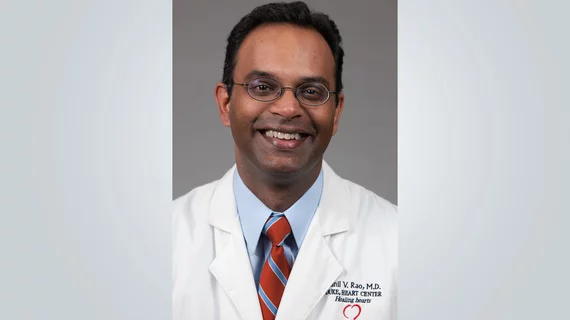Live in Las Vegas: SCAI.19 Expands Focus on Live Cases
The Society for Cardiovascular Angiography and Interventions will convene its 2019 scientific sessions May 19-22.
For its 2019 annual meeting, the Society for Cardiovascular Angiography and Interventions or its 2019 annual meeting, the Society for Cardiovascular Angiography and Interventions (SCAI) decentralized its planning process, moving away from a single committee with broad oversight to several planning groups, each tasked with developing one of the meeting’s five tracks. The result will be a conference that reflects “the diversity of the international interventional community, with even better representation of women and minorities on our faculty than ever before,” says SCAI.19 Program Chair Sunil Rao, MD. “SCAI’s committed to that.”
Rao is a professor of medicine at the Duke Health System, cardiology section chief at the Durham VA Medical Center and editor-in-chief of Circulation: Cardiovascular Interventions. He spoke about the conference with CVB.
You’ve mentioned SCAI.19’s “heavy emphasis on live cases and case-based learning”?
Yes, we’ve invested time learning what our audience is really interested in, and one of the things we confirmed is that people like to see cases because that’s how they learn a lot. We’re showcasing 12 live cases, transmitting them from Ohio-Health Riverside Methodist Hospital in Columbus; HonorHealth in Arizona; Scripps Research in La Jolla, Calif.; University of Washington; University Hospitals in Cleveland; and Barnes-Jewish Hospital in St. Louis. All are world-class centers with a track record of excellence in delivering excellent learning experiences for diverse audiences.
What’s the difference between a great case and a mediocre case?
It has less to do with the case and more to do with the operators, moderators and panel. We’re all interested in cases, no matter what kind. Straightforward or complex, there’s always an interesting aspect. The difference comes from the people who are moderating and those doing the case.
SCAI.19 will feature teams who are experienced at juggling the important task of interacting with the audience while performing the case safely. Our panelists and moderators are experts in the types of case being presented while the panel will deliver a great discussion and get the audience involved.
From the operator’s point of view, what’s the secret sauce for delivering a terrific educational case?
The most important thing is that the operator and the team are committed to performing the case safely. You can never lose sight of the patient outcome. Second, the best live case operators are able to teach—to talk aloud through their thought processes—while they or their partner is doing the case. That’s the perfect springboard for the panel to start a discussion and for the audience to participate. The audience hears what the interventional cardiologist is thinking, what the approach is and why. We also like when operators are open to suggestions from the panel and able to create open-ended questions that encourage discussion and debate.
What are some timely questions or controversies you’ll address in SCAI.19’s five tracks?
It’s hard to name just a few because the field is so dynamic. In the Cath Lab Boot Camp Track, the focus will be on policy issues and quality. Those are perennial issues, but they’re more important than ever with the increased scrutiny on labs from regulators and the administration. With the emphasis on efficiency, this track is a great opportunity for people in cath lab leadership positions. Also, there will be discussion of public reporting in the context of the recent data suggesting it’s not having the intended effect on quality. Attendees will find hot topics like artificial intelligence and digital health integrated throughout the program, but especially in the boot camp track.
There will be a lot on complex coronary intervention because the vast majority of SCAI members are primarily coronary operators. The space is evolving rapidly, so we’ll emphasis what’s new in, for example, left main, CTOs and bifurcations.
SCAI is the only conference in the U.S. that has such specific content on pediatric and adult congenital interventions. As the congenital track shows, it’s now a care continuum.
There are a lot of new data to examine in the peripheral vascular track, including the controversy around paclitaxel-coated balloons. Anyone who performs peripheral interventions should attend SCAI.19 to get insights into that issue.
And, of course, the structural field is evolving so rapidly. We’ll include essential updates on MitraClip, PFO closure, atrial septal defect and TAVR. We’ll also get a bit futuristic, with emerging concepts like the Basilica and Lampoon techniques that have potential in TAVR and TMVR, and we’ll examine advances in tricuspid interventions.
Your keynote speaker is Stanford’s Dr. Abraham Verghese, author of Cutting for Stone?
Yes, Dr. Verghese really started the conversation about how we maintain the doctor-patient relationship in an era dominated by the EHR and digital medicine. It’s important for the interventional cardiology community to discuss this because our world is particularly device-heavy—in the tests and procedures we use and how we document our findings. But at the end of the day, we all are focused on helping patients live longer or live better. Dr. Verghese will give us perspective.
We’re also fortunate to have William O’Neill, MD, of Henry Ford Hospital, sharing insights from his breadth and depth of experience on where the field has come from and where it’s going. Charanjit S. Rihal, MD, of the Mayo Clinic, is renowned for his deep knowledge of healthcare policy and administration and his intellect on how they intersect with interventional cardiology. And Neil Wilson, MD, of Children’s Hospital Colorado, will deliver our featured congenital heart disease lecture, which has the provocative title, “The Agony and the Ecstasy of the Interventional Cardiologist: Bomb Disposal for Cowards.”
Any other program additions you’d like to highlight?
We’re highlighting innovation with a new session on how to take a device from a twinkle in your eye to commercializable, featuring faculty who have done it successfully. The discussion will center around making devices better and more patient-centric.
SCAI.19 also will have a dedicated session on the intersection between heart failure and interventional cardiology, with co-sponsorship by the Heart Failure Society of America as well as an entire session on cardio-oncology. The sessions reflect a bit of a sea change in interventional cardiology, where we acknowledge that SCAI is an interventional professional society that also sits in the context of a larger field with whom we interact. In other words, team-based care.

